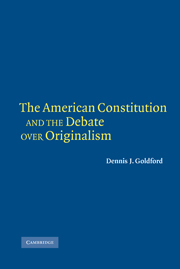Book contents
- Frontmatter
- Contents
- Preface
- Introduction
- 1 The Politics of Originalism
- 2 The Concept of a Living Constitution
- 3 Interpretivism and Originalism
- 4 The Paradox of Originalism
- 5 The Problem of Objectivity
- 6 The Epistemology of Constitutional Discourse (I)
- 7 The Epistemology of Constitutional Discourse (II)
- 8 The Ontology of Constitutional Discourse (I)
- 9 The Ontology of Constitutional Discourse (II)
- 10 Conclusion: The Political Character of Constitutional Discourse
- Index
9 - The Ontology of Constitutional Discourse (II)
Published online by Cambridge University Press: 14 May 2010
- Frontmatter
- Contents
- Preface
- Introduction
- 1 The Politics of Originalism
- 2 The Concept of a Living Constitution
- 3 Interpretivism and Originalism
- 4 The Paradox of Originalism
- 5 The Problem of Objectivity
- 6 The Epistemology of Constitutional Discourse (I)
- 7 The Epistemology of Constitutional Discourse (II)
- 8 The Ontology of Constitutional Discourse (I)
- 9 The Ontology of Constitutional Discourse (II)
- 10 Conclusion: The Political Character of Constitutional Discourse
- Index
Summary
The interpretive analysis of constitutional-legal practice is an attempt to take seriously the idea of rule-governed behavior in a way that, as the previous chapter argued, the objectivist and subjectivist theories do not. It does so by reaffirming the internal approach necessary for an adequate understanding of the constitutive character of constitutional-legal practice. On this interpretive analysis, we understand constitutional-legal practice in terms of government and politics, and we understand government and politics in terms of constitutional-legal practice. Consider how one would assess a standard legal-realist claim from the interpretive point of view:
Law is defined not as a set of logical propositions but in terms of official action. Law is what courts (or other officials) do, not what they say. Until a court has passed on certain facts, some realists argued, there is no law on the subject yet in existence, for the opinion of lawyers is only a guess as to what the courts will decide. Since law is defined in terms of official action (and not of the rules which should guide action), it follows that any force that will influence a judge in reaching a decision (whether corruption, indigestion, or partiality for the other sex) is a fit subject for jurisprudence. Much scorn is poured on the classical jurists for being deceived by what the courts said they were doing instead of examining what they actually did.
- Type
- Chapter
- Information
- The American Constitution and the Debate over Originalism , pp. 263 - 280Publisher: Cambridge University PressPrint publication year: 2005



